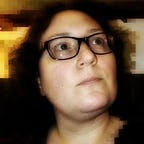Give Your Younger Self More Credit
Stop punishing yourself for mistakes you didn’t make
Taking the opportunity offered by several months of self-isolation to declutter, I found the copies I kept of my graduate work. The writing — and I — wasn’t as bad as I remember.
I also decided now is the time to downsize my massive crafts collection from the postgraduate jobless days when I was trying out the Etsy dream. I was waiting to cringe and laugh at myself from 13 years ago. Instead, I may actually keep some of it.
Why, in my head, is everything I did when I was younger half-assed, misinformed, and just not right?
It’s not unusual to be your own worst critic. Many people spend too much of their limited cognitive capacity being hard on themselves.
Some who see everything they do as subpar suffer from imposter syndrome. They fall in that nice slippery slope of the Dunning-Kruger model where the reality of one’s abilities haven’t yet been accepted because they know enough to know they don’t know everything — so the voice in their head says they must know nothing and to give others more leeway than they give themselves.
For others, it’s a byproduct of low self-esteem or self-worth. The voice in their head tells them that everyone is better than them, and that nothing they do measures up. This then clouds memories as they form to present a perception of self that agrees with the negative interpretation instead of reality.
It’s also a psychological phenomenon among perfectionists. But sometimes it goes too far and can end up being self-limiting and counter-productive. It’s also attributed in some people to past trauma or adverse childhood experiences.
Why can’t we appreciate our own attempts and successes with the same benefit of the doubt we give others?
Psychologists have suggested that the negative voice is a product of rigid rules the human brain develops to handle situations — a Schema. How they approach helping someone mute that voice depends on the exact schema that built it. Unfortunately, the voice is so much a part of the…
